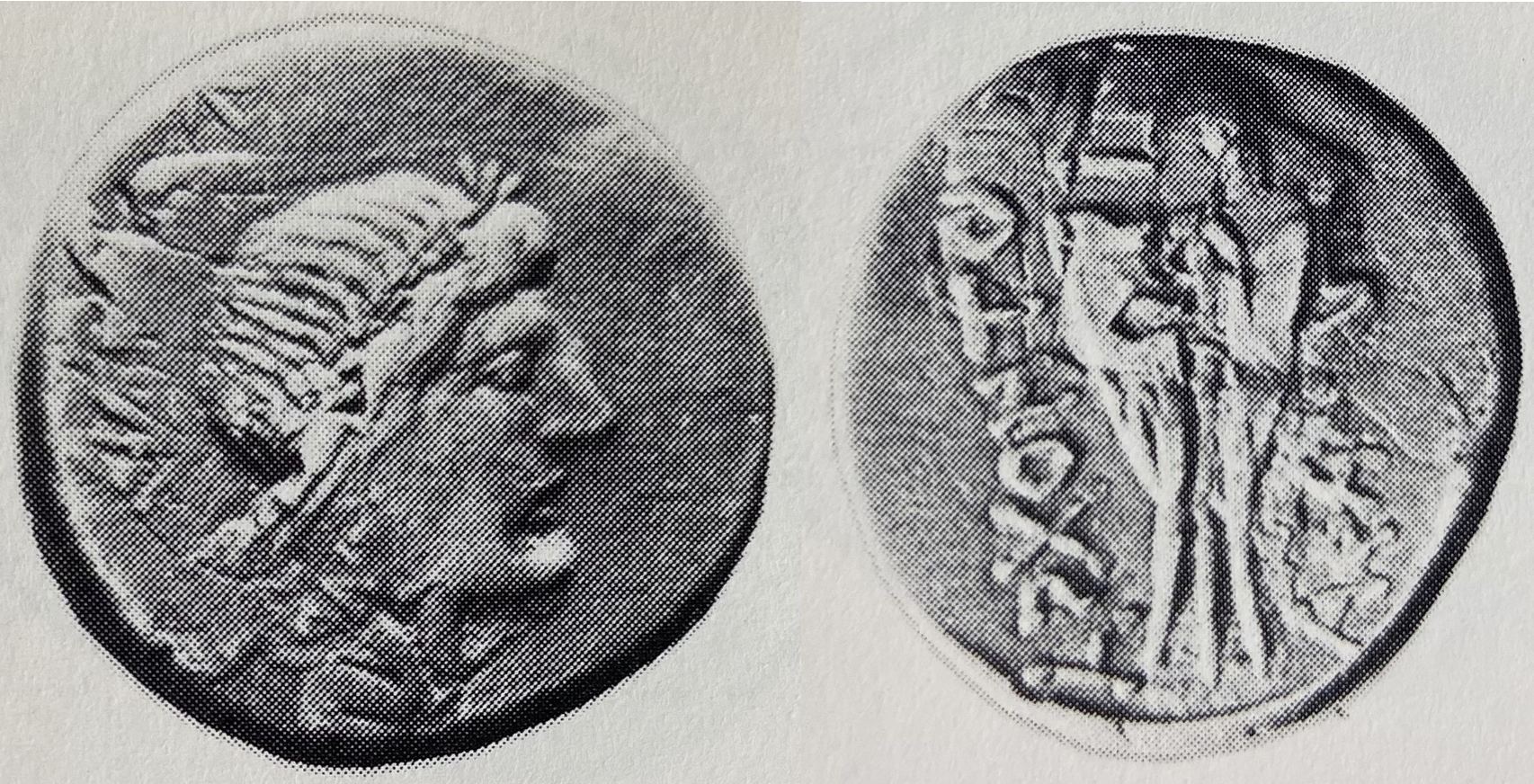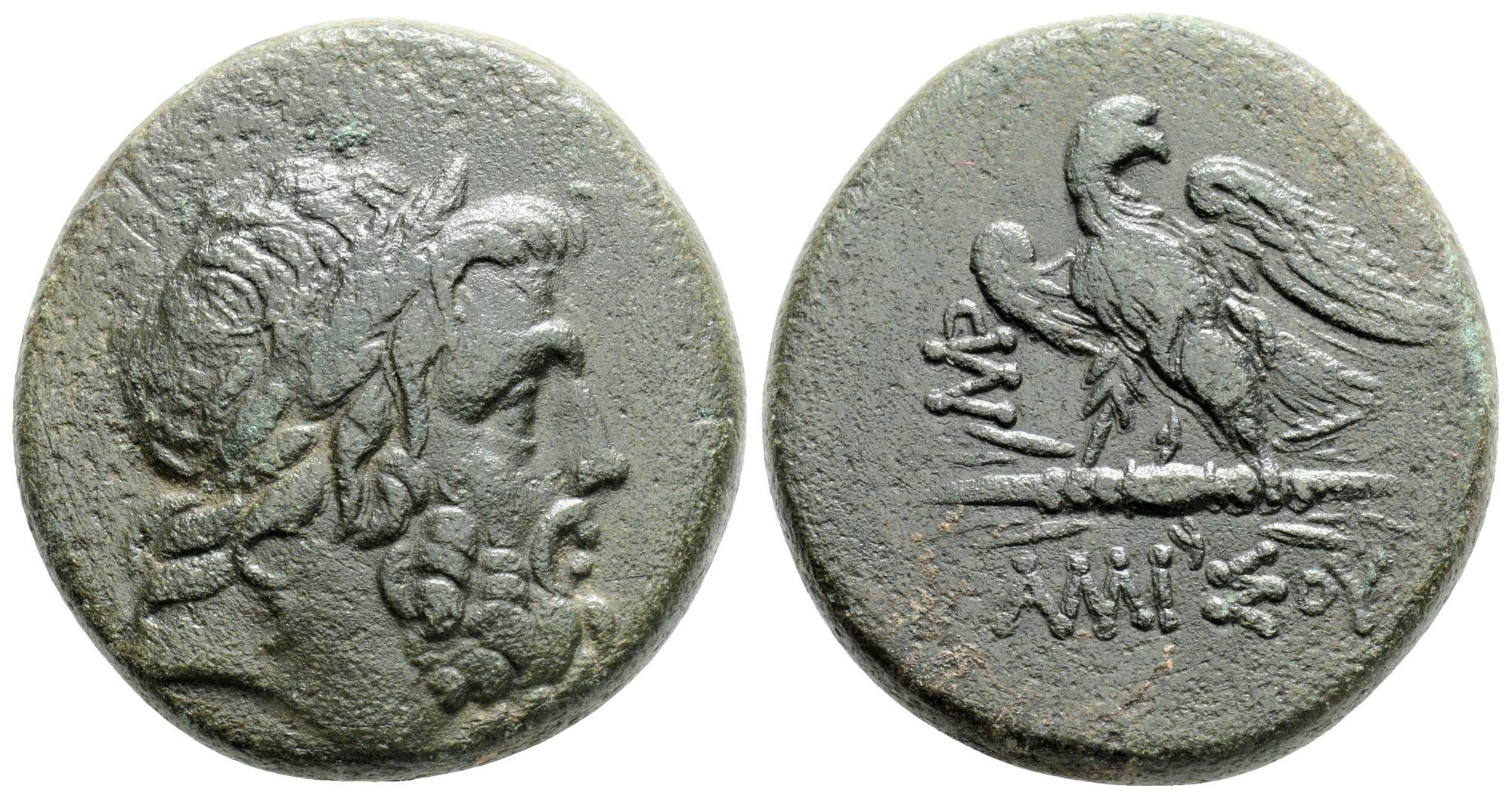2935 - Panticapaeum? (Asander) (AE Apollo/prow) over Pontic bronze (Zeus/eagle) (Lindgren coll. n° A66A): Difference between revisions
From SILVER
No edit summary |
No edit summary |
||
| Line 1: | Line 1: | ||
{{Overstrike | {{Overstrike | ||
|Image overstriking coin= | |Image overstriking coin=691 - Panticapaeum (AE Asander or Apollo-prow-trident) over Pontic bronze.png | ||
|Image overstruck variety=Amisos Zeus Eagle Large.jpg | |Image overstruck variety=Amisos Zeus Eagle Large.jpg | ||
|Private collection=Lindgren collection n° A66A, pl. 107 | |Private collection=Lindgren collection n° A66A, pl. 107 | ||
Revision as of 08:08, 29 June 2023
47 BCE - 17 BCE | ΑΡΧΟΝΤΟΣ AΣΑΝΔΡΟY
Location/history
| Private collection(s)Private collection(s) ᵖ: | Lindgren collection n° A66A, pl. 107 |
Overstriking coin
Description
| ObverseInscription or printing placed on the obverse.: | Head of Asander or Apollo right, wearing laurel wreath. | ReverseInscription or printing placed on the reverse.: | ΑΡΧΟΝΤΟΣ AΣΑΝΔΡΟY (Greek) Prow left and trident. |
Mint and issuing power
| MintIdentifies the place of manufacture or issue of a numismatic object.: | Panticapaeum | Ancient regionAncient region. | Bosporus | Modern countryModern country: Russia (Crimea) | AuthorityIdentifies the issuing power. The authority can be "pretended" when the name or the portrait of X is on the coin but he/she was not the issuing power. It can also be "uncertain" when there is no mention of X on the coin but he/she was the issuing power according to the historical sources: | Asander of Bosporus (Roman client king of the Bosporan Kingdom, 47-17 BC), Bosporan kingdom |
Chronology
| FromIdentifies the initial date in a range assigned in a numismatic context. 47 BCE toIdentifies the final date in a range assigned in a numismatic context.. 17 BCE | Hellenistic and Roman periodTime period of the numismatic object. |
Physical description
| MetalThe physical material (usually metal) from which an object is made.: Bronze |
WeightWeight of the numismatic object (in grams). in grams: 15.2315.23 g <br />15,230 mg <br /> | ||
References
| Coin referenceReference of the Coin: | Lindgren - Kovacs 1985, n° A66A (pl. 107). | Coin series referenceReference to coin series study: | RPC I1RPC I, n° 1845 |
| Coin series web referenceCoin series web references: | |||
Overstruck type
Description
| ObverseInscription or printing placed on the obverse.: | Zeus. | ReverseInscription or printing placed on the reverse.: | Eagle. |
Mint and issuing power
| MintIdentifies the place of manufacture or issue of a numismatic object. ᵖ: | Sinope | Ancient regionAncient region. ᵖ | Paphlagonia | Modern countryModern country: Turkey | AuthorityIdentifies the authority in whose name (explicitly or implicitly) a numismatic object was issued. ᵖ: | Mithridates VI Eupator (king of the Pontic kingdom, c. 120-63 BC), Pontic kingdom |
Chronology
| FromIdentifies the initial date in a range assigned in a numismatic context. 90 BCE toIdentifies the final date in a range assigned in a numismatic context.. 70 BCE | Hellenistic 323-30 BC |
Physical description
References
| Coin type referenceReference to coin series study ᵖ: |
Additional data
| Frequency of overstrikesFrequency of overstrikes: | frequent | Level of confidenceLevel of confidence of the identification: | sure |
| RemarksRemarks: | |||
References
- ^ Amandry, Michel - Burnett, Andrew - Ripolles, Pere Pau (1998), Roman provincial coinage. I. From the death of Caesar to the death of Vitellius (44 BC-AC 69), London-Paris, 2 vol., xvii + 812 p., 195 pl.

